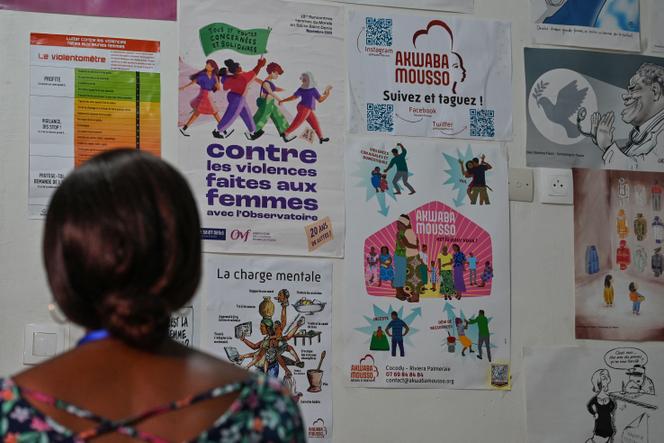


The score was worth celebrating. On Friday, September 13, Ivorian Prime Minister Robert Beugré Mambé couldn't pass up the opportunity for a moment of official self-congratulation before an audience of organizations, government officials and journalists gathered at the Sofitel in Abidjan.
The reason? According to the Social Institutions and Gender Index (SIGI) 2023 drawn up by the Organization for Economic Co-operation and Development (OECD), Côte d'Ivoire is the best-performing African country in the fight against discrimination against women. The country's score is 17.3 (up from 42.8 in 2019), while the global average is 29 (0 being the best score and 100 the worst). "We are entering the elite top 55 countries worldwide," the prime minister proudly stated. Côte d'Ivoire is now ahead of Rwanda (19), South Africa (23) and even Canada (17.5).
The report is based on four categories: discrimination within the family, access to financial resources, violations of physical integrity and restrictions on civil liberties. Evaluation criteria include the existence of laws designed to guarantee gender equality and protect women, the prevalence of gender-based violence (GBV) and the population's perception of women's role and rights.
According to the Ivorian Ministry for Women, this significant progress is the result of women's economic empowerment through support funds, recent laws promoting their rights and advances in the fight against gender-based violence (GBV), such as domestic violence and genital mutilation. "Our specificity is to link gender issues to economic and sustainable development challenges," explained Euphrasie Kouassi Yao, the prime minister's adviser on gender issues and chair of the technical advisory group that worked with the OECD on the country assessment.
In Ivorian feminist circles, however, opinions are more divided. Two days before the announcement, on September 11, the lifeless, dismembered body of 19-year-old influencer Emmanuella Y. was found in a residence in the Cocody district of Abidjan. Initial findings point to her boyfriend as the main suspect. "This is the fourth feminicide we've recorded since the beginning of the month," said Bénédicte Otokoré, deputy secretary general of the Ligue Ivoirienne des Droits de la Femme.
For the activist, the OECD report focuses on the existence of laws, not their effective application. "Good laws have been passed to protect women, but ignorance of these laws feeds a sense of impunity. We are witnessing a normalization of sexist rhetoric, and femicides continue," she stated. What's more, femicides are not one of the six types of GBV recognized by the Ivorian Ministry for Women, so there are no official statistics to count them, "which leads to an unrealistic assessment of the situation," said Otokoré.
Faced with the rising number of femicides, the Ligue Ivoirienne des Droits de la Femme sent a statement to the authorities on September 18, calling for judicial reforms to officially recognize and fight this scourge. This move is supported by journalist and feminist activist Nesmon de Laure, founder of the NGO Opinion Eclairée, who also questioned the country's high score: "Laws raise Côte d'Ivoire's score. But what about the government's actions to fight patriarchy in social norms?"
In recent years, the adoption of several laws has enabled Côte d'Ivoire's legal framework to evolve. The 2019 reform of the family code set the legal age of marriage at 18 for both men and women. The law grants mothers the same parental authority as fathers and allows wives to be included in their husband's inheritance. In the same year, a law establishing a minimum 30% quota for women in elected assemblies was passed. In 2021, a law on domestic violence and rape provided more protection measures for victims of gender-based violence. Since 2016, the creation of gender-specific complaint desks in police stations aims to encourage women to come forward.
Ferela Soro, a lawyer and head of advocacy at the Organisation pour la Réflexion et l’Action Féministe (ORAF), welcomes these legal tools but insists that the judiciary must enforce them with "dissuasive penalties" and that the government must fight "more directly" against sexist acts. "As long as we don't step up awareness-raising efforts and the application of sanctions, the culture of violence against women will persist," she said, citing the example of genital mutilation. Banned since 1988, it still affects 37% of Ivorian women, according to the OECD.
The Ministry for Women acknowledged that "the persistence of cultural stereotypes" is hampering progress. To address this, they are rolling out awareness campaigns, collaborating with influencers to reach young people through social media, and working with community leaders to positively influence perceptions of women's roles.
While the OECD supports Côte d'Ivoire's strategy, it also urges the country to step up its efforts to curb GBV and promote reproductive autonomy. In addition, law enforcement needs to be improved, according to the organization. This is a prerequisite if Côte d'Ivoire hopes to achieve its ambitious goal of ending all forms of discrimination and violence against women by 2030, in line with the UN's Sustainable Development Goals.
Translation of an original article published in French on lemonde.fr; the publisher may only be liable for the French version.
